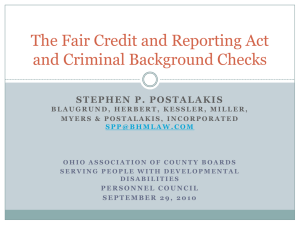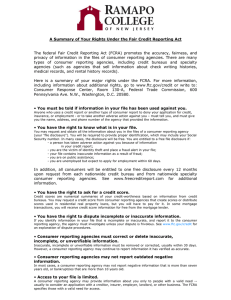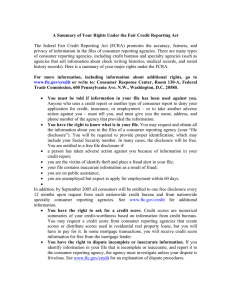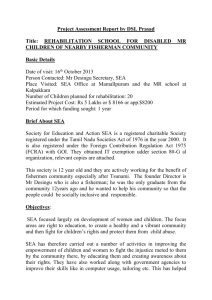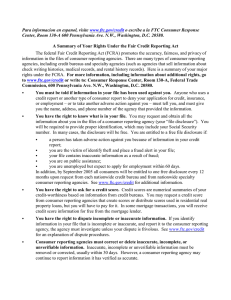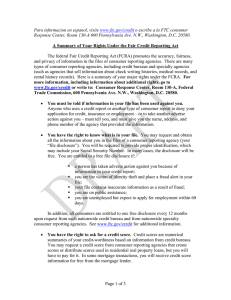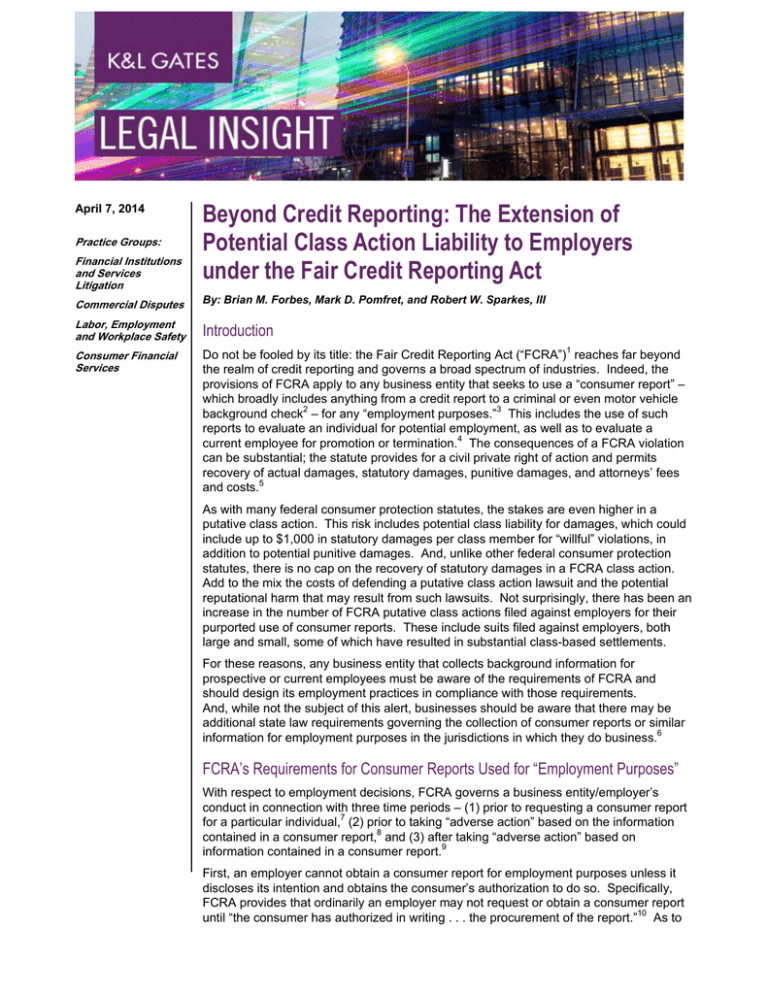
April 7, 2014
Practice Groups:
Financial Institutions
and Services
Litigation
Beyond Credit Reporting: The Extension of
Potential Class Action Liability to Employers
under the Fair Credit Reporting Act
Commercial Disputes
By: Brian M. Forbes, Mark D. Pomfret, and Robert W. Sparkes, III
Labor, Employment
and Workplace Safety
Introduction
Consumer Financial
Services
Do not be fooled by its title: the Fair Credit Reporting Act (“FCRA”)1 reaches far beyond
the realm of credit reporting and governs a broad spectrum of industries. Indeed, the
provisions of FCRA apply to any business entity that seeks to use a “consumer report” –
which broadly includes anything from a credit report to a criminal or even motor vehicle
background check2 – for any “employment purposes.”3 This includes the use of such
reports to evaluate an individual for potential employment, as well as to evaluate a
current employee for promotion or termination.4 The consequences of a FCRA violation
can be substantial; the statute provides for a civil private right of action and permits
recovery of actual damages, statutory damages, punitive damages, and attorneys’ fees
and costs.5
As with many federal consumer protection statutes, the stakes are even higher in a
putative class action. This risk includes potential class liability for damages, which could
include up to $1,000 in statutory damages per class member for “willful” violations, in
addition to potential punitive damages. And, unlike other federal consumer protection
statutes, there is no cap on the recovery of statutory damages in a FCRA class action.
Add to the mix the costs of defending a putative class action lawsuit and the potential
reputational harm that may result from such lawsuits. Not surprisingly, there has been an
increase in the number of FCRA putative class actions filed against employers for their
purported use of consumer reports. These include suits filed against employers, both
large and small, some of which have resulted in substantial class-based settlements.
For these reasons, any business entity that collects background information for
prospective or current employees must be aware of the requirements of FCRA and
should design its employment practices in compliance with those requirements.
And, while not the subject of this alert, businesses should be aware that there may be
additional state law requirements governing the collection of consumer reports or similar
information for employment purposes in the jurisdictions in which they do business.6
FCRA’s Requirements for Consumer Reports Used for “Employment Purposes”
With respect to employment decisions, FCRA governs a business entity/employer’s
conduct in connection with three time periods – (1) prior to requesting a consumer report
for a particular individual,7 (2) prior to taking “adverse action” based on the information
contained in a consumer report,8 and (3) after taking “adverse action” based on
information contained in a consumer report.9
First, an employer cannot obtain a consumer report for employment purposes unless it
discloses its intention and obtains the consumer’s authorization to do so. Specifically,
FCRA provides that ordinarily an employer may not request or obtain a consumer report
until “the consumer has authorized in writing . . . the procurement of the report.”10 As to
Beyond Credit Reporting: The Extension of Potential Class Action
Liability to Employers under the Fair Credit Reporting Act
disclosure, FCRA generally requires that, prior to procuring a consumer report, the
employer make “a clear and conspicuous disclosure . . . that a consumer report may be
obtained for employment purposes,” and that the disclosure be set forth “in a document
that consists solely of the disclosure.”11 This last requirement is important, as some
courts have strictly construed the term “solely” to mean that that inclusion of any material
other than a disclosure (and written authorization12) may alone violate FCRA.13
Second, an employer cannot take an “adverse action” – i.e., decline employment,
terminate employment, or make a similarly negative employment decision14 – based on a
consumer report without first providing certain information to the prospective or current
employee. Specifically, an employer must, in the ordinary course, provide “a copy of the
report” and a written description of the individual’s rights under FCRA (as prescribed by
the Consumer Financial Protection Bureau (“CFPB”)) before taking the contemplated
adverse action.15 And, while not expressly delineated in the statute, it is generally
accepted that an employer must provide the individual with “a reasonable period to
respond to any information in the report that the consumer disputes[,] and with written
notice and the opportunity . . . to respond.”16 At least one court has determined that a
reasonable period to respond may be satisfied where the individual has at least five
business days to respond following his or her receipt of the consumer report.17
Third, after taking an “adverse action,” an employer must provide: (1) additional notice of
the adverse action; (2) certain statutorily-mandated information; (3) the contact
information for the consumer reporting agency that furnished the consumer report,
including a statement that the agency did not make the adverse action decision and
cannot provide specific reasons as to why the adverse action was taken; and (4) the
consumer’s rights to obtain a free copy of the consumer report from the consumer
reporting agency within 60 days and to dispute the accuracy or completeness of any
information in the consumer report to the credit reporting agency.18 Importantly,
however, the post-adverse action notice provisions do not provide an individual with a
private right of action under FCRA; these provisions can only be enforced through an
enforcement action by the Federal Trade Commission or other authorized federal
agency.19
While the above requirements govern most employment-related circumstances, FCRA
also contains slightly different requirements with respect to individuals who apply for
employment with certain transportation-related employers and who apply for employment
solely by “mail, telephone, computer, or other similar means.”20 In these circumstances,
the prospective employer may obtain consent to procure a consumer report “orally, in
writing, or electronically,” but the employer must provide to the prospective employee –
either orally, in writing, or by electronic means – notice “that a consumer report may be
obtained for employment purposes” and a summary of the prospective employee’s rights
under FCRA.21
Additionally, an employer acting under these provisions may take adverse action based
on a consumer report before notifying the prospective employee of the action as long as
the employer provides a specific notice of adverse action, either orally, in writing, or
through electronic means, within three business days of taking the adverse action.22
Upon request, the employer must also provide the prospective employee with a copy of
the consumer report at issue and a copy of the prospective employee’s rights (as
prescribed by the CFPB) within three business days of the consumer’s request.23
It should also be noted that FCRA governs an additional specific subset of “consumer
reports” called “investigative consumer reports.”24 An investigative consumer report
includes “a consumer report or portion thereof” that contains “information on a
consumer’s character, general reputation, personal characteristics, or mode of living” that
2
Beyond Credit Reporting: The Extension of Potential Class Action
Liability to Employers under the Fair Credit Reporting Act
is “obtained through personal interviews with neighbors, friends, or associates of the
consumer . . . or with others with whom he is acquainted or who may have knowledge
concerning any such items of information.”25 Where an employer or prospective
employer intends to obtain an investigative consumer report, additional disclosure
protocols must be followed.26
Potential Exposure for Employers under FCRA
As noted above, the potential exposure for a business entity accused of violating FCRA
may be substantial, especially in a putative class action context. Indeed, FCRA provides
for a private right of action for a consumer to enforce “negligent” and “willful”
noncompliance with its provisions. “Willful noncompliance” has been defined to include
both “knowing” and “reckless” violations of FCRA.
If found liable for a willful violation, a corporate defendant may be liable for: (1) either
actual damages sustained by the consumer or statutory damages of not less than
$100.00 and not more than $1,000.00; (2) punitive damages in an amount “as the court
may allow;” and (3) reasonable attorneys’ fees and costs. Thus, without a cap on
statutory damages, a corporate defendant could potentially be liable for up to $1,000.00
for each class member in a certified class, a total number that could increase rapidly in a
nationwide class action, with punitive damages potentially assessed on top of the
statutory damages award.
If found liable for a negligent violation of FCRA, however, a defendant’s liability is limited
to: (1) any actual damages suffered by the plaintiff; and (2) reasonable attorneys’ fees
and costs. Likely due to the limitation on recoverable damages under a negligencebased claim, most putative class actions allege, at a minimum, claims for willful violations
of FCRA.
In comparing the two civil liability provisions of FCRA, it is notable that the “negligent”
noncompliance section, by its terms, requires a plaintiff to have suffered “actual
damages” to have legal standing to bring an action or to recover under its provisions. On
the other hand, the “willful” noncompliance section provides for a minimum recovery of
statutory damages of $100.00, which raises the issue of whether a plaintiff needs to
prove actual harm and damages to have constitutional standing to bring a FCRA claim
and to recover statutory damages predicated solely on an alleged technical violation of
the statute. To date, the courts that have addressed the issue have generally found that
a plaintiff seeking statutory damages under FCRA need not allege or prove actual
damages or injury to satisfy constitutional standing requirements. This is an issue that
has arisen in connection with other federal consumer protection statutes, but that has yet
to be resolved by the United States Supreme Court.
For these reasons, plaintiffs’ class action attorneys are likely to find claims alleging willful
violations of FCRA attractive and will likely continue to bring putative class actions
asserting such claims against large businesses.
Conclusion
By its terms, FCRA extends beyond credit report furnishers and credit reporting agencies
and has important implications for many other types of business entities. In light of
FCRA’s damages provisions and the recent initiation of putative class actions against
large national companies, business entities which collect background information for
prospective or current employees should stay abreast of the requirements of FCRA and
related state law, and should be proactive in developing sound and logical practices to
comply with FCRA’s provisions.
3
Beyond Credit Reporting: The Extension of Potential Class Action
Liability to Employers under the Fair Credit Reporting Act
Authors:
Brian M. Forbes
brian.m.forbes@klgates.com
+1.617.261.3152
Mark D. Pomfret
mark.pomfret@klgates.com
+1.617.261.3147
Robert W. Sparkes, III
robert.sparkes@klgates.com
+1.617.951.9134
Anchorage Austin Beijing Berlin Boston Brisbane Brussels Charleston Charlotte Chicago Dallas Doha Dubai Fort Worth Frankfurt
Harrisburg Hong Kong Houston London Los Angeles Melbourne Miami Milan Moscow Newark New York Orange County Palo Alto
Paris Perth Pittsburgh Portland Raleigh Research Triangle Park San Diego San Francisco São Paulo Seattle Seoul Shanghai
Singapore Spokane Sydney Taipei Tokyo Warsaw Washington, D.C. Wilmington
K&L Gates practices out of 48 fully integrated offices located in the United States, Asia, Australia, Europe, the Middle East and
South America and represents leading global corporations, growth and middle-market companies, capital markets participants and
entrepreneurs in every major industry group as well as public sector entities, educational institutions, philanthropic organizations
and individuals. For more information about K&L Gates or its locations, practices and registrations, visit www.klgates.com.
This publication is for informational purposes and does not contain or convey legal advice. The information herein should not be used or relied upon
in regard to any particular facts or circumstances without first consulting a lawyer.
©2014 K&L Gates LLP. All Rights Reserved.
1
15 U.S.C. §§ 1681, et seq.
See id. §1681a(d)(1)(B) (defining “consumer report” to mean “any written, oral, or other
communication of any information by a consumer reporting agency bearing on a consumer’s credit
worthiness, credit standing, credit capacity, character, general reputation, personal characteristics, or
mode of living which is used or expected to be used or collected in whole or in part for the purpose of
serving as a factor in establishing the consumer’s eligibility for . . . employment purposes”).
3
See id. § 1681b(b) (setting forth the conditions for furnishing and using consumer reports for
“employment purposes”). Note that the FCRA may also extend liability to third-party entities that
collect and compile consumer reports for employers. See McNamara v. HireRight Solutions, Inc., No.
13 C 5215, 2014 WL 321790, at *5-6 (N.D. Ill. Jan. 29, 2014) (denying in part and granting in part
defendant’s motion to dismiss claims alleging violation of FCRA by third-party company that provided
prospective employer with a background check of prospective employee).
4
See 15 U.S.C. § 1681a(h) (defining “employment purposes” under FCRA).
5
See id. § 1681n (civil liability for willful noncompliance); id. § 1681o (civil liability for negligent
noncompliance); see also id. § 1681s (providing for administrative enforcement of FCRA).
6
Indeed, FCRA expressly provides that it generally does not alter, amend, affect, or pre-empt state law,
except as specifically set forth in FCRA or to the extent the state law is “inconsistent” with FCRA’s
provisions. 15 U.S.C. § 1681t(a).
7
See 15 U.S.C. § 1681b(b).
8
See id.
9
See id. § 1681m.
10
Id. § 1681b(b)(2)(A) (ii).
11
Id. § 1681b(b)(2)(A) (i) (emphasis added).
12
Id. § 1681b(b)(2)(A) (ii) (providing that the required authorization to obtain a consumer report “may
be made on” the FCRA-mandated disclosure document).
2
4
Beyond Credit Reporting: The Extension of Potential Class Action
Liability to Employers under the Fair Credit Reporting Act
13
See, e.g., Reardon v. ClosetMaid Corp., No. 2:08-cv-01730, 2013 WL 6231606, at *7-9 (W.D. Pa.
Dec. 2, 2013) (finding that clear and conspicuous disclosure and authorization form “facially” violated
FCRA because of the inclusion of a release of liability related to obtaining a consumer report);
Singleton v. Domino’s Pizza, LLC, No. DKC 11-1823, 2012 WL 245965, at *7-9 (D. Md. Jan. 25,
2012) (“both the statutory text and FTC advisory opinions indicate that an employer violates the FCRA
by including a liability release in a disclosure document”).
14
See 15 U.S.C. § 1681a(k)(B)(ii) (defining adverse action to include “a denial of employment or any
other decision for employment purposes that adversely affects any current or prospective employee”).
15
Id. § 1681b(b)(3)(A).
16
H.R. Rep. 103-486 at 40 (1994); Reardon, 2013 WL 6231606, at *12.
17
See Reardon, 2013 WL 6231606, at *12-13 (citing H.R. Rep. 103-486 at 40 (1994)).
18
See id. § 1681m(a).
19
See id. § 1681m(h)(8).
20
See id. § 1681b(b)(2)(B), § 1681b(b)(2)(C), § 1681b(b)(3)(B).
21
Id. § 1681b(b)(2)(B).
22
See id. § 1681b(b)(3)(B)(i) (required notice must include, among other things: (1) “that adverse
action has been taken based in whole or in part on a consumer report received from a consumer
reporting agency;” (2) “the name, address and telephone number of the consumer reporting agency that
furnished the consumer report;” (3) “that the consumer reporting agency did not make the decision to
take adverse action and is unable to provide to the consumer the specific reasons why the adverse
action was taken;” and (4) “that the consumer may . . . request a free copy of a report and may dispute
with the consumer reporting agency the accuracy or completeness of any information in a report.”).
23
See id. § 1681b(b)(3)(B)(ii).
24
See id. §§ 1681d, 1681l.
25
Id. § 1681a(e). Notably, in collecting information for an investigative consumer report, a consumer
reporting agency cannot make an inquiry on a consumer for employment purposes if doing so the
employer or prospective employer “would violate any applicable Federal or State equal employment
opportunity law or regulation.” Id. § 1681d (2).
26
See id. §§ 1681d(a), (b).
5


